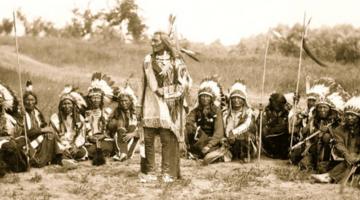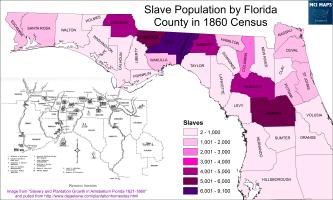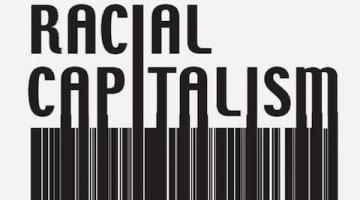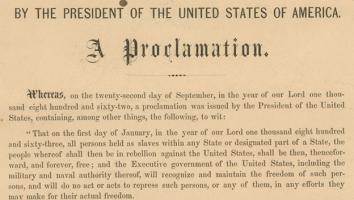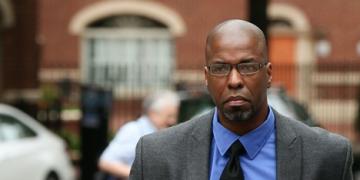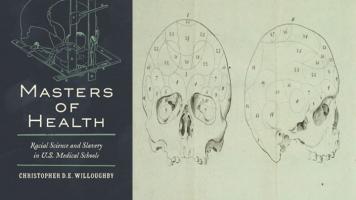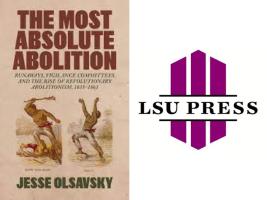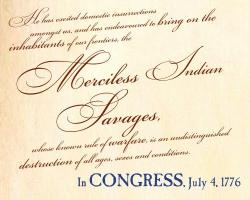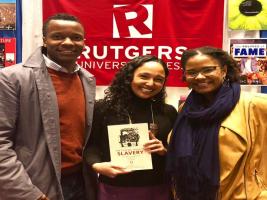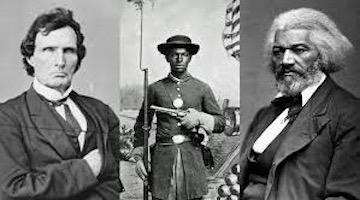Red dots cover the faces of slaveholders who signed the Declaration of Independence (Image: Twitter @arlenparsa)
Black Agenda Report editors Margaret Kimberley and Ann Garrison discuss the personal and institutional hypocrisy which allowed those who said, "All men are created to equal," to be slaveholders.
"Americans like to think of themselves as an exceptional people bound together by noble ideals. This belief is challenged, however, when history is taught more honestly and fully, without omitting facts or telling outright lies. Presidents are outsized characters in America’s narrative about itself. Children attend schools named after them; there are monuments dedicated to them in every state. They have their own national holiday, Presidents’ Day, which presents an opportunity for the country’s virtues to be celebrated. We are conditioned to feel a deep connection to these men hundreds of years after some of them have died."
That's a paragraph from "Prejudential," Black Agenda Report Executive Editor Margaret Kimberley's book about the racial prejudice manifested by every single US president in history.
I spoke to Margaret Kimberley about George Washington and Thomas Jefferson, 246 years after they signed the Declaration of Independence on July 4, 1776.
Ann Garrison: Let's begin with the first paragraph of your first chapter, which is about our first President George Washington. Tell us about George Washington's false teeth.
Margaret Kimberley: There's a lot of mythology surrounding Washington that we're indoctrinated with from the time we're in grade school—the cherry tree, cannot-tell a-lie, and so on. And one of the favorites is that he had false teeth, but they were made of wood. Well, they were not made of wood, he had dentures that at that time were made of ivory and metal. But there was also, at the time, tooth transplantation. And some of the dentures were actual teeth that were taken from enslaved people that he held. And I opened with this because I think it's important for people to understand the brutality of slavery. I mean, tooth extraction is painful now, with anesthesia with modern medicine, so that was just torture. There's no other way to describe what it had to mean at that time. I thought it was important for readers to understand what Washington demanded, and the system of slavery, which he was very much a part of.
AG: Now tell us why Washington, quoting your book, “rotated his human property for six month intervals between Pennsylvania and Virginia.”
MK: Well, the US capital, before Washington DC was built, kept moving further south. It was first in New York City, where Washington was inaugurated, then it moved on to Philadelphia while this new city was being built.
And Pennsylvania had a law which said that any enslaved person who was in Pennsylvania for more than six months could petition for their freedom. And this created a problem for George Washington, because that meant the people he held could potentially be freed. So he never allowed any of them to be in Philadelphia for that six-month period, which was a violation of the spirit and the letter of that law, because the authors of the law had realized that such a loophole would allow people to do what Washington did. And so this rotating people in and out was forbidden in that statute. Washington consciously and deliberately broke that law.
AG: So the father of our country broke the law to hold on to his enslaved people.
MK: Yes, he did. He and his wife Martha owned more than 200 human beings. Most of those were people who were called dower slaves. That is to say, they belonged to the estate of Martha Washington's first husband, Daniel Parker Custis. And the fact that Washington and his wife owned so many people is very, very significant. It explains a lot about this country.
AG: Can you tell us the story of Oney Judge, one of Washington's enslaved people?
MK: Yes. Oney Judge was a young woman who managed to escape from Washington when they were in Philadelphia. She escaped with the help of some people in the small free population there. She managed to make her way to New Hampshire but the Washingtons never gave up trying to get her back.
They found out she was there. They tried to lure her back. Washington wrote a letter to someone seeking their assistance and calling her ungrateful. “The ingratitude of the girl who was brought up and treated more like a child than a servant,” he wrote. That tells you a lot, that despite having more than 200 people, this one young woman escaping was a threat to their entire enterprise.
And they were also lying to her because they could not legally free her, as she was one of these people referred to as dower slaves. So they lied to try to get her back. She was smart enough to know that she shouldn't, and she managed to remain free the rest of her life.
AG: Okay, let's move on to Thomas Jefferson, the American president most often quoted for his erudite writing and scholarship about the foundation of the new republic. Tell us about Jefferson and the Louisiana Purchase.
MK: Well, the Louisiana Purchase, which is now roughly half of the United States, was, obviously Louisiana, Arkansas, states in the Upper Midwest, the Dakotas, New Mexico, what's now Texas, and so on.
These territories came into the US after the Haitian Revolution and France’s loss of Haiti. Losing this very profitable French territory meant that France needed money, and so they chose to sell their territories on the North American continent to the United States.
These territories came into America's possession when Jefferson was president, and he had a lot of power over what happened in them. But he was also a slaveholder, and though he would claim he thought slavery was evil, that it was wrong, he never freed one person, not even one.
And he could have. Had he been telling the truth about wanting to end slavery, this was his opportunity. There were suggestions about gradual emancipation, and so forth, but he was obviously not interested in that.
These new territories instead allowed the US to expand slavery, and this just goes to show you how much of a hypocrite he was. This was the continuation of the settler colonial project, the ethnic cleansing of the indigenous population, stealing their lands, and spreading slavery as far and wide as they possibly could.
AG: Did you in your research ever come across Jefferson's relationship with Lafayette, the French aristocrat who eventually abandoned his aristocratic status and became known simply as Gilbert du Motier? During the American Revolutionary War, he led a battalion of soldiers who had escaped from Haiti, then devoted the rest of his life to abolition and often urged Jefferson to free his enslaved people. It doesn’t seem surprising that so few of us know his story.
MK: I did not focus on Lafayette. I did, however, write about General Tadeusz Kosciuszko, the Polish Army officer who fought on the side of the US in the Revolutionary War, who had been a slaveholder but gave up the practice and urged Jefferson to do the same.
Jefferson always claimed he couldn't afford it. So Kosciuszko collected money and left it to Jefferson in his will, his argument being ‘okay, if you say you can't afford it, I will give you money and it'll compensate you.’ But to make a long story short, that did not happen, despite the fact that Kosciuszko died first.
As far as Black people fighting in the revolution goes, most of them fought for the British, because the British promised freedom to an enslaved person who fought for them. And there were many Black troops on the side of the British; many of them made their way to Canada after the war, to Nova Scotia in particular, and there are Black communities in Nova Scotia to this very day because of that,
AG: Is there anything you'd like to say about Sally Hemings?
MK: Sally Hemings was one of the 600 people that Jefferson held in slavery. She was his wife's half sister. Her father was a white man, and so was her grandfather. She and Jefferson had five children together, the first one when, I believe, she was only 15 years of age. He never freed her. He never freed any of those children he had with her. And I think it's important for people to know that too.
That's not just salacious gossip. It says a lot about him as a person, about slavery, and about the way that Black women were victimized by men like Jefferson. I think it's important to keep in mind and I'm glad it's something that has come into wider knowledge over the years, that it's gone from being gossiped about to being actually proven to be true, with DNA testing and other evidence.
AG: He didn't free his own children?
MK: No, he did not. And that was not uncommon.
There were some exceptions. There were men who would free their own kids and provide for them in some way. But there were a lot like Thomas Jefferson. And it's ironic that “Jefferson” is considered a “Black name.” I think most people with the last name Jefferson are Black, which is one of those ironies and slight mysteries of history.
But no, he did not free his own children.
And that shows you the extent of his hypocrisy, it shows you the extent of his own personal immorality, and the true nature of the people called founding fathers, who we are taught even at this late date in history, to admire and respect. They committed genocide against the indigenous population and against Black people as well.
AG: According to the Monticello tourist history idealizing Jefferson, “Beverly and Harriet were allowed to leave Monticello in 1822; Madison and Eston were released in Jefferson's 1826 will,” but he never freed Sally Hemmings.
MK: Does "allowed to leave" mean they were freed? If 2 of them were freed in his will, they weren't freed in his lifetime. I'm comfortable saying he didn't free them.
AG: Okay, is there anything else you'd like to say about these presidents whom Glen Ford called “them sons of bitches”?
MK: Well, on the Fourth of July holiday, I think it's important to understand why they declared independence from Britain. They were concerned that the British might end slavery. They were also concerned that the British were impeding their efforts to settle further west, beyond the eastern seaboard.
But Britain had a problem with France; there’d been the Seven Years War, from 1756 to 1863, which was called here the French and Indian War because it was the British against the French and their indigenous allies.
Just to be clear, Britain and France were both trying to steal Indian land. But in any case, after that war ended, Britain wanted to make peace and forbade settlements west of the Appalachians, which inconvenienced people like George Washington who had already purchased land past the Appalachians.
So that was in 1763. And it was one of the biggest reasons that there's a Fourth of July holiday at all. They wanted the entire continent. They did not want Britain to stand in their way. They had other arrangements with France, which allowed them to claim territories and what's now the US Midwest. And in order to complete and really fulfill the settler colonial project, they had to have an independent nation that was free from the British crown.
I think it's important to have that information and understand why there was an independence movement at all.
Ann Garrison is a Black Agenda Report Contributing Editor based in the San Francisco Bay Area. In 2014, she received the Victoire Ingabire Umuhoza Democracy and Peace Prize for her reporting on conflict in the African Great Lakes region. She can be reached at ann(at)anngarrison.com.

